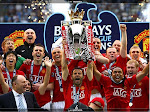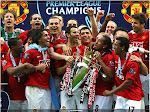 Roy Keane is an Irish former professional footballer and the current manager of English Premier League club Sunderland.A dominating central-midfielder, Keane has been hailed as one of the greatest players to grace the game in the modern era. In a highly successful 17-year career, he played for Cobh Ramblers in Ireland, Nottingham Forest and, most notably, Manchester United (both in England), before ending his career with a brief spell at Celtic in Scotland.
Roy Keane is an Irish former professional footballer and the current manager of English Premier League club Sunderland.A dominating central-midfielder, Keane has been hailed as one of the greatest players to grace the game in the modern era. In a highly successful 17-year career, he played for Cobh Ramblers in Ireland, Nottingham Forest and, most notably, Manchester United (both in England), before ending his career with a brief spell at Celtic in Scotland.Keane was noted for his aggressive and highly-competitive style of play, an attitude which helped him excel as captain of Manchester United from 1997 until his departure in 2005. Keane helped United achieve a period of unprecedented success in more than 12 years at the club, during which he established himself as one of the greatest players in the club's history.
He played at international level for much of his career, representing the Republic of Ireland over a period of fourteen years, most of which he spent as captain. In the 1994 FIFA World Cup he played in every game although he was sent home from the 2002 World Cup after an argument with national coach Mick McCarthy.
During his first season as Sunderland manager, he took the club from twenty-third position in the Coca-Cola Championship to win the league and gain promotion to the Premier League. Keane's arrival has been largely attributed as the catalyst for Sunderland's remarkable recovery.
After Eric Cantona's unexpected retirement, Keane took over as club captain, although he missed most of the 1997-98 season because of a cruciate ligament injury caused by an attempt to tackle Leeds United player Alf-Inge Håland which went horribly wrong for Keane. As Keane lay prone on the ground, Håland stood over Keane, accusing the injured United captain of having tried to hurt him and of f eigning injury to escape punishment; an allegation which would lead to an infamous dispute between the two players four years later. Keane had been injured in the ninth game of the season, and did not return to competitive football that campaign. He watched from the sidelines as United squandered an eleven-point lead over Arsenal to miss out on the Premiership title. Many pundits cited Keane's absence as a crucial factor in the team's surrender of the league trophy. He initially expressed doubts as to whether he would play again due to the severity of his injury, but he recovered in time to begin pre-season training for the new campaign.
eigning injury to escape punishment; an allegation which would lead to an infamous dispute between the two players four years later. Keane had been injured in the ninth game of the season, and did not return to competitive football that campaign. He watched from the sidelines as United squandered an eleven-point lead over Arsenal to miss out on the Premiership title. Many pundits cited Keane's absence as a crucial factor in the team's surrender of the league trophy. He initially expressed doubts as to whether he would play again due to the severity of his injury, but he recovered in time to begin pre-season training for the new campaign.
"It was the most emphatic display of selflessness I have seen on a football field. Pounding over every blade of grass, competing if he would rather die of exhaustion than lose, he inspired all around him. I felt it was an honour to be associated with such a player."Sir Alex Ferguson on Keane's performance against Juventus in 1999.
Any fears that Keane's injury may have reduced his effectiveness as a player were dispelled in the 1998-99 season, when he returned to captain the side to an unprecedented treble of the FA Premier League, FA Cup, and UEFA Champions League. One of his finest performances in this campaign was an inspirational display against Juventus in the second leg of the Champions League semi-final, when he helped haul his team back from two goals down to win 3–2, a game regarded around Europe as one of the best performances on a football field in the modern era of European football. He scored from a header to start United's comeback and continually drove the team forwards at every opportunity. His performance in Turin has been described as his finest hour as a footballer. Earlier in the match, however, Keane had received a yellow card that ruled him out of the final after a trip on Zinedine Zidane. In the final, United defeated Bayern Munich 2-1 at Nou Camp, but Keane had mixed emotions about the victory due to his suspension.
Recalling his thoughts before the game, Keane said: "Although I was putting a brave face on it, this was just about the worst experience I'd had in football." Later that year, Keane scored the only goal in the finals of the Intercontinental Cup, as United defeated Palmeiras.
Keane caused controversy in December 2000, when he criticised sections of United supporters after the Champions League victory over Dynamo Kiev at Old Trafford. He complained about the lack of vocal support given by some fans when Kiev were dominating the game, stating: "Away from home our fans are fantastic, I'd call them the hardcore fans. But at home they have a few drinks and probably the prawn sandwiches, and they don't realise what's going on out on the pitch. I don't think some of the people who come to Old Trafford can spell 'football', never mind understand it." Keane's rant started a debate in England about the changing atmosphere in football grounds.
He made headlines again in the 2001 Manchester Derby, a game in which Alf-Inge Håland played. Five minutes from the final whistle, he was sent off for a blatant knee-high foul on the Norwegian in what was seen by many as an act of re venge. He initially received a three game suspension and a £5,000 fine from the FA, but further punishment was to follow after the release of Keane's autobiography in August 2002, in which he stated that he intended "to hurt" Håland. Keane's account of the incident was as follows:
venge. He initially received a three game suspension and a £5,000 fine from the FA, but further punishment was to follow after the release of Keane's autobiography in August 2002, in which he stated that he intended "to hurt" Håland. Keane's account of the incident was as follows:
I'd waited long enough. I fucking hit him hard. The ball was there (I think). Take that you cunt. And don't ever stand over me sneering about fake injuries.
An admission that the tackle was in fact a premeditated assault, it left the FA with no choice but to charge Keane with bringing the game into disrepute. He was banned for a further five matches and fined £150,000 in the ensuing investigation. Despite widespread condemnation, he later maintained in his autobiography that he had no regrets about the incident: "My attitude was, fuck him. What goes around comes around. He got his just rewards. He fucked me over and my attitude is an eye for an eye." Håland briefly considered taking legal action against Keane, but after both legal and medical advice he later decided otherwise. The Norwegian retired from football shortly afterwards, stating on his website that it was a recurring problem in his other leg that was causing him pain, rather than an injury resulting from Keane's tackle.
Throughout the 2000s, Keane maintained a healthy rivalry with Arsenal captain Patrick Vieira. The most notable incident between the two took place at Highbury in 2005 at the height of an extreme period of bad blood between United and Arsenal. Vieira was seen confronting United defender Gary Neville in the tunnel before the game over his fouling of Jose Antonio Reyes in the previous encounter between the two sides , prompting Keane to verbally confront the Arsenal captain. The incident was broadcast live on Sky Sports, with Keane clearly heard imploring match referee Graham Poll to "Tell him [Vieira] to shut his fucking mouth!" After the game, which United won 4-2, Keane controversially criticised Viera's decision to play internationally for France instead of his birthplace of Senegal. However, Vieira later suggested that having walked out on his National team in the World Cup finals Keane was not in a good position to comment on such matters. Referee Poll later revealed that he should have sent off both players before the match had begun, though was under pressure not to do so.
Overall, Keane would lead United to 9 major honours, making him the most successful captain in the club's history. Keane scored his 50th goal for Manchester United on 5 February 2005 in a league game against Birmingham City. His appearance in the 2005 FA Cup final, which United lost to Arsenal in a penalty shootout, was his seventh such game, an all-time record in English football at the time. Keane also jointly holds the record for the most red cards received in English football, being dismissed a total of 13 times in his career. He was inducted into the English Football Hall of Fame in 2004 in recognition of his undoubted impact on the English game, and became the only Irish player to be selected into the FIFA 100, a list of the greatest living footballers picked by Pelé.


No comments:
Post a Comment